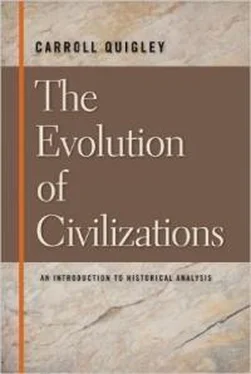A glance at any map of the Mediterranean shows that it consists of two great basins divided by the line Calabria-Sicily-Tunis. This geographic schism was strengthened in the historic period by the fact that the eastern basin became Greek-speaking while the western basin became Latin. Most important of all, since Classical civilization originated near Phoenician influence in the eastern part of the eastern basin and spread along the west-running seaways, the core area and the peripheral areas of Mediterranean civilization became separated from each other by more than the usual chronological lag. Cultural distinctions as well as chronological ones are characteristic of these two portions of any civilization, but usually the periphery tends to surround the core, and such extreme geographic separation does not arise. This fact was, of course, also important in Canaanite civilization, where the core was in the Levant while the universal empire arose in the West. In Classical civilization the tendency for the society to split into eastern and western parts was always strong; it was counterbalanced, until the society was in its final stage, by the relative superiority of water transportation over land transportation. As a consequence of this, any part of the Mediterranean shore was likely to be more closely linked with any other part than it would be, by land communications, with its own hinterlands. The instrument of expansion of Classical civilization was a social organization, slavery. This came into existence in the period of mixture as a consequence of the invasions of the Iron Age intruders. It remained an instrument so long as the slaveowners worked closely with their slaves, often in the fields themselves, as Cincinnatus was doing when appointed dictator, because then the surplus from the slave labor which accumulated to the owner from his legal rights over his slaves could be used for some productive use, since the owner's personal knowledge of the agricultural process permitted him to judge where such investment could best be made. But in the later period, when the slaves were operated in gangs in charge of a steward—usually a freed slave— with the owner absent from the estate for long periods, output suffered, investment decreased or was improperly applied, and expansion slowed up. After several centuries of this, the slave system became a highly inefficient method of agricultural production, with output, expressed either in terms of unit areas or in terms of labor expended, considerably below that of neighboring farms operated by their owners on a family basis. Pliny tells us that output per area was much greater on family farms than it was on latifundia. Slaveowners, whose prestige, economic independence, and leisure for political activity depended on their slaves, were determined to resist any efforts to free their slaves or to divide up their estates into family-size farms. The argument for greater production would have left them unmoved even if it had been made. Even if the landlords had obtained compensation for loss of their lands and slaves, there was no other practical way in which they could have invested their funds because of the great technological backwardness of the Classical economy. This excluded redistribution of land and freeing of slaves as practical large-scale alternatives to the latifundia system, and meant that the system could not be liquidated by any voluntary method but only by confiscation and violence, as finally occurred. But before it did occur Classical civilization had been destroyed by the struggles over this issue and especially by the vain efforts of the slaveowning group to prevent their own liquidation as a social and economic group. Moreover, replacement of the latifundia by peasant farms would have been no real solution because it would have resulted in a more equitable distribution of the society's income and ended most accumulation of capital. The only good solution was replacement of the slave institution by another instrument of expansion, but that meant the replacement of Classical civilization by another civilization.
It has sometimes been argued that slavery could not possibly have played the central role in Classical civilization which we are attributing to it, because the number of slaves in the society was relatively small and many of them were well treated or were used in essentially nonproductive activities, such as household tasks. These objections are quite beside the point, and are unconvincing even when they are supported by elaborate statistical studies. Such statistical studies are based on the available written evidence, mostly Athenian, and do show that the slaves were only a minority of the Athenian population (about one-quarter) and were often household servants. Such studies overlook less specific evidence tending to show that the percentage of slaves was probably higher in many rural areas, especially in Dorian states. In Sparta, for example, the number of Helots was certainly several times the number of Spartan citizens, even in the early period, and the proportion increased in the later period as the number of Spartan citizens decreased. And in Roman Italy there is good evidence that the countryside lost much of its peasant population and increased its number of slaves during several centuries following the end of the Second Punic War (201 B.C.).
Moreover, even if the most moderate estimates produced by the later-day apologists for Classical slavery are taken as correct, this in no way would reduce the significance of slavery as the instrument of expansion of Classical civilization. All that we require of such an instrument is that it be an important (or perhaps the most important) mechanism in accumulating and investing savings in the society. Such a role, I believe, cannot be withheld from Classical slavery. Other organizations performed similar functions in Mediterranean civilization, as they do in all societies, but the important role played by slavery in the organizational dynamics of Classical antiquity can hardly be denied.
The attempts to deny it, which are frequently quite emotional, even when they are made by classicists who pride themselves on their objectivity, are but one class of examples of a notable weakness in Classical studies. This weakness arises from the failure, by the average classicist, to seek a complete and rounded view of Classical society. Instead it is usual to specialize one's attention on a few aspects of the subject, preferably on literature or philosophy or archaeology or even on only part of one of these: on Greek thought but not on Latin, on Plato but not on Virgil, on Aristotle but not on Theophrastus or Pythagoras or Archimedes, on Athenian excavations but not on Anatolian or on Etruscan ones.
And, of course, students who deal with these humanist areas have little time for other aspects of Classical society, such as science or mathematics or education, and are most unlikely to have any concern with such mundane matters as technology, economic organization, or the dynamics of social classes. Yet no adequate picture of Classical antiquity can be reconstructed without attention to all its aspects.
This is a weakness in Classical studies that has been remedied to some extent in recent years. But certainly not sufficiently remedied. We still hear a good deal of emotional talk about the "Greek miracle" or the "Greek genius." The "Greek miracle" is a term applied to the erroneous belief that Greek culture sprang up, fully formed, in no more than a couple of generations out of complete barbarism. This is based upon erroneous ideas about the nature of Greek culture, the speed with which it arose, and the background from which it emerged. To mention only one point: any culture that came from a mixture of Cretan, Phoenician, and Indo-European elements did not start from nothing, or from barbarism. As for "Greek genius," there can be no doubt that for a brief period, for a select social group, in a restricted area, there was a great opportunity for men to develop their higher capacities, but there is no need for awestruck tones implying that some hereditary, biological burst of genius hit, like lightning, among the Greeks in Classical antiquity, without leaving any traces of its passage among their descendants over the next two thousand years.
Читать дальше










